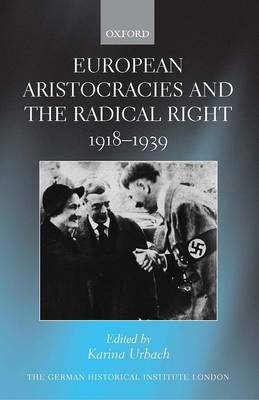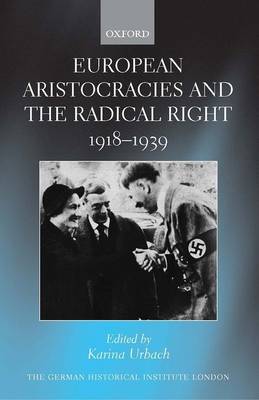
En raison d'une grêve chez bpost, votre commande pourrait être retardée. Vous avez besoin d’un livre rapidement ? Nos magasins vous accueillent à bras ouverts !
- Retrait gratuit dans votre magasin Club
- 7.000.000 titres dans notre catalogue
- Payer en toute sécurité
- Toujours un magasin près de chez vous
En raison de la grêve chez bpost, votre commande pourrait être retardée. Vous avez besoin d’un livre rapidement ? Nos magasins vous accueillent à bras ouverts !
- Retrait gratuit dans votre magasin Club
- 7.000.0000 titres dans notre catalogue
- Payer en toute sécurité
- Toujours un magasin près de chez vous
European Aristocracies and the Radical Right, 1918-1939
93,95 €
+ 187 points
Description
This volume brings together the most recent research on European aristocracies in the first half of the twentieth century. An international array of social and political historians analyses the aristocracies of eleven countries at a particularly testing time: the interwar years. After the First World War aristocrats were confronted with revolutions, republics, and an influx of 'Bolshevist' ideas. Debates about a new order in which aristocrats would play a leading part took place in all countries after 1918. The Mussolini model, in particular, seemed an ideal solution and had an impact on aristocrats all over Europe. Here the exchange of ideas between networks of related aristocratic families played a part in spreading pro-fascist ideas. Anti-Semitism, anti-Bolshevism, and a belief in charismatic leadership also led to admiration of leaders such as Horthy and Franco. In all countries radical right-wing movements tried to recruit aristocrats as symbolic if not strategic figureheads. Is it possible, therefore, to speak of a last flourishing of the aristocracy in countries where fascist or authoritarian regimes were successful? Or are we falling for a left-wing conspiracy theory by overestimating the aristocracy's political prowess and failing to see that they often stood as a conservative bulwark against the radical right? The book shows that if radical right-wing parties could not offer new avenues to power centres, aristocrats, despite a natural predisposition, were not tempted to join, or soon lost interest. Yet their flirtations and short-term entanglements with these movements show that they played a destructive role in the great crisis years of parliamentarism.
Spécifications
Parties prenantes
- Editeur:
Contenu
- Nombre de pages :
- 256
- Langue:
- Anglais
- Collection :
Caractéristiques
- EAN:
- 9780199231737
- Date de parution :
- 07-12-07
- Format:
- Livre relié
- Format numérique:
- Ongenaaid / garenloos gebonden
- Dimensions :
- 145 mm x 225 mm
- Poids :
- 439 g

Les avis
Nous publions uniquement les avis qui respectent les conditions requises. Consultez nos conditions pour les avis.





